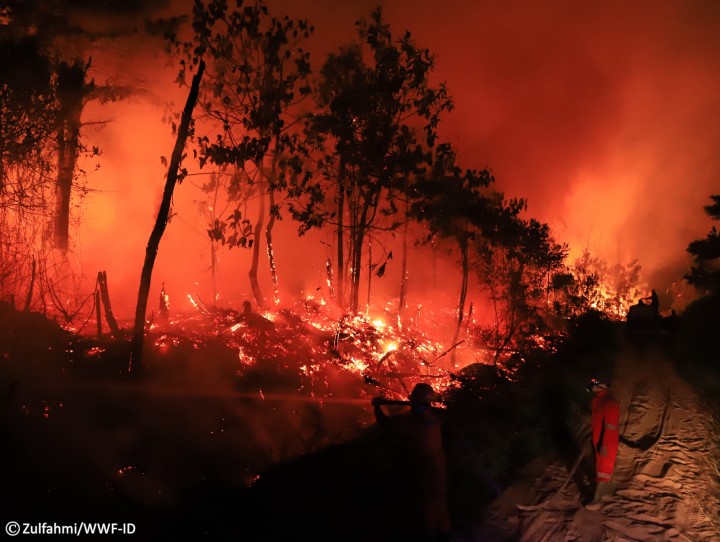Sumatra, Tenurial rights, Pulp & paper, APP, BMH, Bumi Mekar Hijau, fire, peat, sinar mas, South Sumatra,
APP’s suppliers burned again in South Sumatra this year
EoF News / 08 November 2019

Analysis on fire hotspots distribution as detected by satellite NASA FIRM VIIRS showed that Asia Pulp & Paper’s timber suppliers dominated the list of timber corporate group razed by fires in South Sumatra province during October 2019.
As occurrence of fire hotspots and burnings decrease drastically in many provinces since October, South Sumatra was still shrouded by toxic haze until last month. EoF analyzed that Asia Pulp & Paper (APP) timber suppliers had most hotspots detected by the satellite with total 2,634 hotspots (see Map). It is followed by Marubeni group, and PT Ciptamas Bumi Subur, a supplier of mangrove white charcoal.
Eyes on the Forest learns that many areas beyond industrial timber plantation (HTI) are largely detected for hotspot with total 13,541. Lack of database on palm oil plantation in the province had hampered the coalition to break down the details on plantations burned.
Map of fire hotspot distribution in South Sumatra for October 2019
APP suppliers that burned in the province are PT Bumi Mekar Hijau, PT Rimba Hutani Mas, PT Sebangun Bumi Andalas Wood Industries, and PT Bumi Andalas Permai. PT BMH was defendant of forest fires in 2014 that penalized to pay a fine of IDR 78 billion (USD 5.5 million) after High District Court of Palembang in 2016 overturned decision by District Court who acquit free the company in December 2015.
Previously, the Ministry of Environment and Forestry sued the company to pay a compensation amount to IDR 7.9 trillion for the burnings of 20,000 hectares of peatlands in 2014. The lawsuit was rejected by the Judges of Palembang District Court in December 2015.
Media reports said in 2016 the company would like to pay the smaller compensation for environmental destruction charge as decided by High Court of Palembang. EoF had no update whether the Ministry would file appeal against the decision set by the High Court or just accepted the decision.
EoF reported four years ago that four SMG/APP suppliers in South Sumatra, PT. Bumi Andalas Permai, PT. Bumi Mekar Hijau, PT. Rimba Hutani Mas and PT. Sebangun Bumi Andalas Wood Industries, received “Preventative Measures Notices” from Singapore’s National Environmental Agency (NEA) for possible transgression of the Transboundary Haze Pollution Act. The companies are having serious fire issues in 2015.
EoF learns that SMG/APP suppliers have a long history of fires. The company’s concessions on Riau’s peat had even more fires than those in South Sumatra in 2007, 2008, 2010, 2013 and 2014.
Provincial Disaster Mitigation Agency (BPBD) of South Sumatra said 255,904 hectares of land and forest in the province razed by fires this year. The data taken by October 20, said Ansori, an official of BPBD as quoted by RMOL Sumsel (Nov 4). Ogan Komering Ilir (OKI) is the largest burned area with 135,622 hectares, followed by Musi Banyuasin with 46,717 hectares. OKI regency is home for OKI pulp and paper mill owned by APP/Sinar Mas.
In South Sumatra, during 2019 burnings, a four-month infant was dead after suffering Upper Respiratory Tract Infection and a 60-year old was razed to death as he cleared his land by burning.
Burned
Sipongi website managed by the Ministry of Environment and Forestry said 75,871 hectares of land and forest burned in Riau in 2019 which exceeding the numbers in 2017 and 2018 with 6,866 hectares and 37,236 hectares respectively. The data from MoEF also noted that total 857,756 hectares of area burned nationwide from January to September 2019 which divided into two categories: mineral soil was 630,451 hectares, and peatlands 227,304 hectares. Central Kalimatan province is the largest impacted area with 134,227 hectares and followed by West Kalimatan with 127,462 hectares (Kompas.com, Oct 22).
The Indonesian Police’s Criminal Investigation Agency probe three corporate suspects of burnings, namely PT AP, PT YSM and PT WSSI. Meanwhile, Riau Police Office probe PT SSS, and PT TI, South Sumatra police handle PT HBL, and Jambi police probe PT MAS and PT DSSP, CNN Indonesia website reported.
The Police said 345 individual suspects named in the country and 17 corporate suspects which believed were mostly palm oil companies.